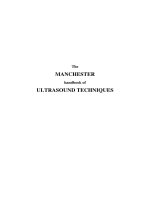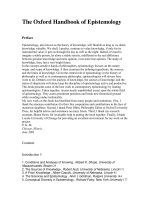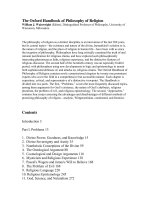zelazo - the cambridge handbook of consciousness (cambridge, 2007)
Bạn đang xem bản rút gọn của tài liệu. Xem và tải ngay bản đầy đủ của tài liệu tại đây (6.54 MB, 999 trang )
This page intentionally left blank
P1: KAE
0521857430pre CUFX049/Zelazo 0 521 85743 0 printer: cupusbw March 3, 2007 16:33
The Cambridge Handbook of Consciousness
The Cambridge Handbook of Consciousness is the
first of its kind in the field, and its appearance
marks a unique time in the history of intellectual
inquiry on the topic. After decades during which
consciousness was considered beyond the scope
of legitimate scientific investigation, conscious-
ness re-emerged as a popular focus of research
toward the end of the last century, and it has
remained so for nearly 20 years. There are now
so many different lines of investigation on con-
sciousness that the time has come when the field
may finally benefit from a book that pulls them
together and, by juxtaposing them, provides a
comprehensive survey of this exciting field.
Philip David Zelazo is Professor of Psychology
at the University of Toronto, where he holds
a Canada Research Chair in Developmental
Neuroscience. He is also Co-Director of the
Sino-Canadian Centre for Research in Child
Development, Southwest University, China. He
was Founding Editor of the Journal of Cogni-
tion and Development. His research, which is
funded by the Natural Sciences and Engineer-
ing Research Council (NSERC) of Canada, the
Canadian Institutes of Health Research (CIHR),
and the Canadian Foundation for Innovation
(CFI), focuses on the mechanisms underly-
ing typical and atypical development of exec-
utive function – the conscious self-regulation
of thought, action, and emotion. In September
2007, he will assume the Nancy M. and John
L. Lindhal Professorship at the Institute of Child
Development, University of Minnesota.
Morris Moscovitch is the Max and Gianna Glass-
man Chair in Neuropsychology and Aging in
the Department of Psychology at the University
of Toronto. He is also a Senior Scientist at the
Rotman Research Institute of Baycrest Centre
for Geriatric Care. His research focuses on the
neuropsychology of memory in humans but also
addresses attention, face recognition, and hemi-
spheric specialization in young and older adults,
and in people with brain damage.
Evan Thompson is Professor of Philosophy at the
University of Toronto. He is the author of Mind
in Life: Biology, Phenomenoloy, and the Sciences of
Mind and Colour Vision: A Study in Cognitive Sci-
ence and the Philosophy of Perception. He is also
the co-author of The Embodied Mind: Cognitive
Science and Human Experience. He is a former
holder of a Canada Research Chair.
i
P1: KAE
0521857430pre CUFX049/Zelazo 0 521 85743 0 printer: cupusbw March 3, 2007 16:33
ii
P1: KAE
0521857430pre CUFX049/Zelazo 0 521 85743 0 printer: cupusbw March 3, 2007 16:33
The Cambridge Handbook
of Consciousness
Edited by
Philip David Zelazo, Morris Moscovitch
and Evan Thompson
University of Toronto
iii
CAMBRIDGE UNIVERSITY PRESS
Cambridge, New York, Melbourne, Madrid, Cape Town, Singapore, São Paulo
Cambridge University Press
The Edinburgh Building, Cambridge CB2 8RU, UK
First published in print format
ISBN-13 978-0-521-85743-7
ISBN-13 978-0-521-67412-6
ISBN-13 978-0-511-28923-1
© Cambridge University Press 2007
2007
Information on this title: www.cambridge.org/9780521857437
This publication is in copyright. Subject to statutory exception and to the provision of
relevant collective licensing agreements, no reproduction of any part may take place
without the written
p
ermission of Cambrid
g
e University Press.
ISBN-10 0-511-28923-5
ISBN-10 0-521-85743-0
ISBN-10 0-521-67412-3
Cambridge University Press has no responsibility for the persistence or accuracy of urls
for external or third-party internet websites referred to in this publication, and does not
g
uarantee that any content on such websites is, or will remain, accurate or a
pp
ro
p
riate.
Published in the United States of America by Cambridge University Press, New York
www.cambridge.org
hardback
paperback
paperback
eBook (EBL)
eBook (EBL)
hardback
P1: KAE
0521857430pre CUFX049/Zelazo 0 521 85743 0 printer: cupusbw March 3, 2007 16:33
To the memory of Francisco J. Varela (7 September 1946–28 May 2001)
–ET
To my growing family: Jill, Elana, David, Leora, and Ezra Meir
–MM
For Sam, and the next iteration
– PDZ
And a special dedication to Joseph E. Bogen (13 July 1926–22 April 2005)
v
P1: KAE
0521857430pre CUFX049/Zelazo 0 521 85743 0 printer: cupusbw March 3, 2007 16:33
vi
P1: KAE
0521857430pre CUFX049/Zelazo 0 521 85743 0 printer: cupusbw March 3, 2007 16:33
Contents
List of Contributors page xi
1. Introduction 1
part i
THE COGNITIVE SCIENCE
OF CONSCIOUSNESS
a. philosophy
2 . A Brief History of the Philosophical
Problem of Consciousness 9
William Seager
3. Philosophical Theories of
Consciousness: Contemporary
Western Perspectives 35
Uriah Kriegel
4. Philosophical Issues:
Phenomenology 67
Evan Thompson and Dan Zahavi
5. Asian Perspectives: Indian Theories
of Mind 89
Georges Dreyfus and Evan Thompson
b. computational approaches
to consciousness
6. Artificial Intelligence and
Consciousness 117
Drew McDermott
7. Computational Models of
Consciousness: A Taxonomy
and Some Examples 151
Ron Sun and Stan Franklin
c. cognitive psychology
8. Cognitive Theories of
Consciousness 177
Katharine McGovern and
Bernard J. Baars
9. Behavioral, Neuroimaging, and
Neuropsychological Approaches to
Implicit Perception 207
Daniel J. Simons, Deborah E.
Hannula, David E. Warren, and
Steven W. Day
vii
P1: KAE
0521857430pre CUFX049/Zelazo 0 521 85743 0 printer: cupusbw March 3, 2007 16:33
viii contents
10. Three Forms of Consciousness in
Retrieving Memories 251
Henry L. Roediger III, Suparna
Rajaram, and Lisa Geraci
11. Metacognition and Consciousness 289
Asher Koriat
12 . Consciousness and Control
of Action 327
Carlo Umilt`a
d. linguistic considerations
13. Language and Consciousness 355
Wallace Chafe
14. Narrative Modes of Consciousness
and Selfhood 375
Keith Oatley
e. developmental psychology
15. The Development
of Consciousness 405
Philip David Zelazo, Helena Hong
Gao, and Rebecca Todd
f. alternative states of
consciousness
16. States of Consciousness: Normal
and Abnormal Variation 435
J. Allan Hobson
17. Consciousness in Hypnosis 445
John F. Kihlstrom
18. Can We Study Subjective
Experiences Objectively?
First-Person Perspective
Approaches and Impaired
Subjective States of Awareness
in Schizophrenia 481
Jean-Marie Danion and Caroline
Huron
19. Meditation and the Neuroscience
of Consciousness: An Introduction 499
Antoine Lutz, John D. Dunne, and
Richard J. Davidson
g. anthropology/social
psychology of consciousness
20. Social Psychological Approaches
to Consciousness 555
John A. Bargh
21. The Evolution of Consciousness 571
Michael C. Corballis
22. The Serpent’s Gift: Evolutionary
Psychology and Consciousness 597
Jesse M. Bering and David F.
Bjorklund
23. Anthropology of Consciousness 631
C. Jason Throop and Charles
D. Laughlin
h. psychodynamic approaches to
consciousness
24. Motivation, Decision Making, and
Consciousness: From
Psychodynamics to Subliminal
Priming and Emotional Constraint
Satisfaction 673
Drew Westen, Joel Weinberger, and
Rebekah Bradley
part ii
THE NEUROSCIENCE OF
CONSCIOUSNESS
a. neurophysiological mechanisms
of consciousness
25. Hunting the Ghost: Toward a
Neuroscience of Consciousness 707
Petra Stoerig
26. Neurodynamical Approaches to
Consciousness 731
Diego Cosmelli, Jean-Philippe
Lachaux, and Evan Thompson
b. neuropsychological aspects of
consciousness: disorders and
neuroimaging
27. The Thalamic Intralaminar Nuclei
and the Property of Consciousness 775
Joseph E. Bogen
P1: KAE
0521857430pre CUFX049/Zelazo 0 521 85743 0 printer: cupusbw March 3, 2007 16:33
contents ix
28. The Cognitive Neuroscience of
Memory and Consciousness 809
Scott D. Slotnick and Daniel
L. Schachter
c.affectiveneuroscience
of consciousness
29. The Affective Neuroscience
of Consciousness: Higher-
Order Syntactic Thoughts,
Dual Routes to Emotion
and Action, and
Consciousness 831
Edmund T. Rolls
d. social neuroscience of
consciousness
30. Consciousness:Situated andSocial 863
Ralph Adolphs
part iii
QUANTUM APPROACHES TO
CONSCIOUSNESS
31. Quantum Approaches to
Consciousness 881
Henry Stapp
Author Index 909
Subject Index 939
P1: KAE
0521857430pre CUFX049/Zelazo 0 521 85743 0 printer: cupusbw March 3, 2007 16:33
x
P1: KAE
0521857430pre CUFX049/Zelazo 0 521 85743 0 printer: cupusbw March 3, 2007 16:33
List of Contributors
Ralph Adolphs, PhD
Department of Psychology
California Institute of Technology
HSS 228-77
Pasadena, CA 91125 USA
E-mail:
Bernard J. Baars, PhD
The Neurosciences Institute
10640 John Jay Hopkins Drive
San Diego, CA 92121 USA
E-mail:
John A. Bargh, PhD
Department of Psychology
Yale University
2 Hillhouse Avenue
P.O. Box 208205
New Haven, CT 06520-8205 USA
E-mail:
Jesse M. Bering, PhD
Institute of Cognition and Culture
Queen’s University, Belfast
4 Fitzwilliam Street
Belfast, Northern Ireland BT71NN
E-mail:
David F. Bjorklund, PhD
Department of Psychology
Florida Atlantic University
Boca Raton, FL 33431-0091 USA
E-mail:
Joseph E. Bogen, MD (Deceased)
Formerly of University of Southern California
and the University of California, Los Angeles
Rebekah Bradley
Department of Psychiatry and Behavioral
Sciences
Emory University
1462 Clifton Road
Atlanta, GA 30322 USA
E-mail:
Wallace Chafe, PhD
Department of Linguistics
University of California, Santa Barbara
Santa Barbara, CA 93106 USA
E-mail:
Michael C. Corballis, PhD
Department of Psychology
University of Auckland
Private Bag 92019
Auckland 1020 NEW ZEALAND
E-mail:
Diego Cosmelli, PhD
Centro de Estudios Neurobiol
´
ogicos
Departomento de Psiquiatr
´
oa
P. Universidad Cat
´
olica de Chile
Marcoleto 387, 2
◦
piso
Santiago, Chile
xi
P1: KAE
0521857430pre CUFX049/Zelazo 0 521 85743 0 printer: cupusbw March 3, 2007 16:33
xii list of contributors
(Also: Laboratoire de neurosciences Cognitives
et Imagerie C
´
er
´
ebrale (LENA)
47 Bd de l’H
ˆ
opital, 75651 Paris FRANCE)
E-mail:
Jean-Marie Danion, MD
INSERM Unit
´
e 405
H
ˆ
opital Civil de Strasbourg – Clinique
Psychiatrique
1 place de l’H
ˆ
opital – BP n
◦
426
67091 STRASBOURG Cedex FRANCE
E-mail: jean-marie.danion@chru
strasbourg.fr
Richard J. Davidson, PhD
W. M. Keck Laboratory for Functional Brain
Imaging and Behavior
Waisman Center
University of Wisconsin-Madison
1500 Highland Avenue
Madison, WI 53703-2280 USA
E-mail:
Steven W. Day, BSc
Department of Psychology
University of Illinois
603 East Daniel Street
Champaign, IL 61820 USA
Georges Dreyfus, PhD
Department of Religion
Williams College
E14 Stetson Hall
Williamstown, MA 01267 USA
E-mail:
John D. Dunne, PhD
Department of Religion
Emory University
Mailstop: 1535/002/1AA
537 Kilgo Circle
Atlanta, GA 30322 USA
E-mail:
Stan Franklin, PhD
Institute for Intelligent Systems
The University of Memphis
Memphis, TN 38152 USA
E-mail:
Helena Hong Gao, PhD
School of Humanities and Social Sciences
Nanyang Technological University
Singapore 639798
E-mail:
Lisa Geraci, PhD
Department of Psychology
Washington University
One Brookings Drive
Campus Box 1125
St. Louis, MO 63130-4899 USA
E-mail:
Deborah E. Hannula
Psychology Department
University of Illinois
603 E. Daniel Street, Room 807
Champaign, IL 61820 USA
E-mail:
J. Allan Hobson, MD
Massachusetts Mental Health Center
Psychiatry, S12
74 Fenwood Road
Boston, MA 02115 USA
E-mail: allan
Caroline Huron, MD, PhD
INSERM 0117
Service Hopitalo-Universitaire de Sant
´
e Mentale
et Th
´
erapeuthique
H
ˆ
opital Sainte-Anne
Universit
´
e Paris V
Pavillon Broca
2 ter rue d’Al
´
esia
75014 Paris FRANCE
E-mail:
John F. Kihlstrom, PhD
Department of Psychology, MC 1650
University of California, Berkeley
Tolman Hall 3210
Berkeley, CA 94720-1650 USA
E-mail:
Asher Koriat, PhD
Department of Psychology
University of Haifa
Haifa 31905 ISRAEL
E-mail:
Uriah Kriegel, PhD
Department of Philosophy
Social Science Bldg. Rm 213
P.O. Box 210027
Tucson, AZ 85721-0027 USA
E-mail:
Jean-Philippe Lachaux
INSERM – Unit
´
e 280
Centre Hospitalier Le Vinatier
B
ˆ
atiment 452
95 Boulevard Pinel
69500 BRON, FRANCE
E-mail:
P1: KAE
0521857430pre CUFX049/Zelazo 0 521 85743 0 printer: cupusbw March 3, 2007 16:33
list of contributors xiii
Charles D. Laughlin, PhD
Department of Sociology and Anthropology
Carleton University
125 Colonel By Drive
Ottawa,ONK1S 5B6 CANADA
Antoine Lutz, PhD
W. M. Keck Laboratory for Functional Brain
Imaging and Behavior
Waisman Center
University of Wisconsin-Madison
1500 Highland Avenue
Madison, WI 53703-2280 USA
E-mail:
Drew McDermott, PhD
Department of Computer Science
Yale University
P.O. Box 208285
New Haven, CT 06520-8285 USA
E-mail:
Katharine McGovern, PhD
California Institute of Integral Studies
1453 Mission Street
San Francisco, CA 94103 USA
E-mail:
Keith Oately, PhD
Department of Human Development and
Applied Psychology
Ontario Institute for Studies in
Education/University of Toronto
252 Bloor Street West
Toronto, ON M5S 1V6 CANADA
E-mail:
Suparna Rajaram, PhD
Department of Psychology
SUNY at Stony Brook
Stony Brook, NY 11794-2500 USA
E-mail:
Henry L. Roediger III, PhD
Department of Psychology, Box 1125
Washington University
One Brookings Drive
St. Louis, MO 63130-4899 USA
E-mail:
Edmund T. Rolls, PhD
University of Oxford
Department of Experimental Psychology
South Parks Road
Oxford OX13UD ENGLAND
E-mail:
Daniel L. Schachter, PhD
Department of Psychology
Harvard University
Cambridge, MA 02138 USA
E-mail:
William Seager, PhD
Department of Philosophy
University of Toronto at Scarborough
265 Military Trail
Scarborough, ON M1C 1A4 CANADA
E-mail:
Daniel J. Simons, PhD
Psychology Department
University of Illinois
603 E. Daniel Street, Room 807
Champaign, IL 61820 USA
E-mail:
Scott D. Slotnick
Department of Psychology
Boston College
McGuinn Hall
Chestnut Hill, MA 02467 USA
E-mail:
Henry Stapp, PhD
Lawrence Berkeley National Lab
Physics Division
1 Cyclotron Road Mail Stop 50A-5101
Berkeley, CA 94720-8153 USA
E-mail:
Petra Stoerig, PhD
Institute of Physiological Psychology
Heinrich-Heine-University
D
¨
usseldorf D-40225 GERMANY
E-mail:
Ron Sun, PhD
Cognitive Science Department
Rensselaer Polytechnic Institute
110 Eighth Street, Carnegie 302A
Troy, NY 12180 USA
E-mail:
Evan Thompson, PhD
Department of Philosophy
University of Toronto
15 King’s College Circle
Toronto, ON M5S 3H7 CANADA
E-mail:
C. Jason Throop, PhD
Department of Anthropology
University of California, Los Angeles
341 Haines Hall
Los Angeles, CA 90095 USA
E-mail:
P1: KAE
0521857430pre CUFX049/Zelazo 0 521 85743 0 printer: cupusbw March 3, 2007 16:33
xiv list of contributors
Rebecca Todd, BA
Department of Human Development and
Applied Psychology
Ontario Institute for Studies in
Education/University of Toronto
252 Bloor Street West
Toronto, Ontario M5S 1V6 CANADA
E-mail:
Carlo Umilt
`
a, PhD
Dipartimeto di Psicologia Generale
Universita di Padova
via 8 Febbraio, 2-35122 Padova ITALY
E-mail:
David E. Warren, BSc
Department of Psychology
University of Illinois
603 E. Daniel Street
Champaign, IL 61820 USA
E-mail:
Joel Weinberger, PhD
Derner Institute
Adelphi University
Box 701
Garden City, NY 11530 USA
E-mail:
Drew Westen, PhD
Department of Psychology
Emory University
532 N. Kilgo Circle
Atlanta, GA 30322 USA
E-mail:
Dan Zahavi, PhD
Danish National Research Foundation
Center for Subjectivity Research
Kobmagergade 46
DK-1150 Copenhagen K DENMARK
E-mail:
Philip David Zelazo, PhD
Department of Psychology
University of Toronto
100 St. George Street
Toronto, ON M5S 3G3 CANADA
E-mail:
(After September 2007:
Institute of Child Development
University of Minnesota
51 East River Road
Minneapolis, MN 55455 USA
E-mail: )
P1: KAE
0521857430pre CUFX049/Zelazo 0 521 85743 0 printer: cupusbw March 3, 2007 16:33
The Cambridge Handbook of Consciousness
xv
P1: KAE
0521857430pre CUFX049/Zelazo 0 521 85743 0 printer: cupusbw March 3, 2007 16:33
xvi
P1: JzG
0521857430c01 CUFX049/Zelazo 0 521 85743 0 printer: cupusbw January 5, 2007 3:36
CHAPTER 1
Consciousness: An Introduction
Philip David Zelazo, Morris Moscovitch, and Evan Thompson
The Cambridge Handbook of Consciousness
brings together leading scholarsfrom around
the world who address the topic of con-
sciousness from a wide variety of perspec-
tives, ranging from philosophical to anthro-
pological to neuroscientific. This handbook
is the first of its kind in the field, and its
appearance marks a unique time in the his-
tory of intellectual inquiry on the topic.
After decades during which consciousness
was considered beyond the scope of legiti-
mate scientific investigation, consciousness
re-emerged as a popular focus of research
during the latter part of the last century and
it has remained so for more than 20 years.
Indeed, thereare nowso manydifferent lines
of investigation on consciousness that the
time has come when the field may finally
benefit from a book that pulls them together
and, by juxtaposing them, provides a com-
prehensive survey of this exciting field.
By the mid-1990s, if not earlier, it was
widely agreed that one could not get a full
appreciation of psychological phenomena –
for example, of perception or memory –
without distinguishing between conscious
and unconscious processes. The antecedents
of this agreement are many, and it would
be beyond the scope of this Introduction to
do more than highlight a few (for further
discussion, see Umilt
`
a & Moscovitch, 1994).
One of the mostobvious is the so-called cog-
nitive revolution in psychology and the sub-
sequent emergence ofcognitive science asan
interdisciplinary enterprise. Whereas previ-
ously psychologists sought to describe law-
ful relations between environmental stimuli
and behavioral responses, in the mid-1950s
or so they began to trace the flow of infor-
mation through a cognitive system, viewing
the mind as a kind of computer program.
It eventually became clear, however, that by
focusing on the processing of information –
the kind of thing a computer can do –
psychology left out most of what really
matters to us as human beings; as conscious
subjects, it left us cold. The cognitive revo-
lution opened the door to the study of such
topics as attention and memory, and some
time later, consciousness came on through.
The pre-1990s tendency to avoid discus-
sions of consciousness, except in certain con-
texts (e.g., in phenomenological philoso-
phy and psychoanalytic circles), may have
1
P1: JzG
0521857430c01 CUFX049/Zelazo 0 521 85743 0 printer: cupusbw January 5, 2007 3:36
2 the cambridge handbook of consciousness
been due, in part, to the belief that con-
sciousness necessarily was a kind of ghost in
the machine – one that inevitably courted
the awful specter of dualism. Since then,
however, our ontological suppositions have
evolved, and this evolution may be a conse-
quence of the growing trendtoward interdis-
ciplinary investigation– seen, for example, in
the emergence of cognitive science and neu-
roscience as coherent fields. The transdisci-
plinary perspective afforded by new fields
may have engendered an increased open-
ness and willingness to explore problems
that earlier were deemed too difficult to
address. Certainly, it provided the means
that made these problems seem soluble.
Indeed, precisely because consciousness is
such a difficult problem, progress in solv-
ing it probably depends on a convergence of
ideas and methodologies: We are unlikely to
arrive at an adequate understanding of con-
sciousness in the absence of a transdiscipli-
nary perspective.
Clinical sciences, and in particular neu-
ropsychology, also played a prominent role
in helping usher in a new willingness to
tackle the problem of consciousness. Vari-
ous unusual syndromes came to light in the
latter half of the 20th century, and these
syndromes seemed to demand an explana-
tion in terms of consciousness. Blindsight is
a good example: In this syndrome, patients
with lesions to the occipital lobe of the
brain are phenomenologically blind, but can
nonetheless perform normally on a number
of visual tasks. Another example is amne-
sia, in which people who are phenomeno-
logically amnesic as a result of damage to
medial temporal lobes or the diencephalon
can acquire, retain, and recover informa-
tion without awareness. Similar examples
emerged in other domains, and it soon
became clear that processes under con-
scious control complement, or compete
with, unconscious processes in the control
of cognition and behavior. These issues are
also beginning to play a major role in the
rigorous, scientific analysis of psychopathol-
ogy, the one field in which concerns with the
role of conscious and unconscious processes
have played a steady role since Freud. More-
over, some of these same atypical phenom-
ena (e.g., blindsight) have also been demon-
strated in non-human animals, raising the
possibility that consciousness is not associ-
ated exclusively with human beings.
A third prominent contribution to the
current state of affairs is the development
of new techniques that have made it pos-
sible to treat consciousness in a more rig-
orous and scientifically respectable fashion.
Foremost among these is the development
of neuroimaging techniques that allow us to
correlate performance and subjective expe-
rience with brain function. These techniques
include electrophysiological methods, such
as magneto-encephalography (MEG), and
various types of functional neuroimaging,
including functional magnetic resonance
imaging (fMRI). The analytic sophistication
of these technologies is growing rapidly, as
is the creation of new technologies that will
expand our capabilities to look into the brain
more closely and seek answers to questions
that now seem impossible to address.
There is currently considerable interest in
exploring the neural correlates of conscious-
ness. There is also a growing realization,
however, that it will not be possible to
make serious headway in understanding con-
sciousness without confronting the issue of
how to acquire more precise descriptive
first-person reports about subjective expe-
rience (Jack & Roepstorff, 2003, 2004).
Psychologists, especially clinical psycholo-
gists and psychotherapists, have grappled
with this issue for a long time, but it has
gained new prominence thanks to the use
of neuroimaging techniques. Here one guid-
ing idea is that it may be possible to recover
information about the highly variable neu-
ral processes associated with conscious-
ness by collecting more precise, trial-by-
trial first-person reports from experimental
participants.
If ever it was possible to do so, cer-
tainly serious students of the mind can
no longer ignore the topic of conscious-
ness. This volume attempts to survey the
major developments in a wide range of
intellectual domains to give the reader an
appreciation of the state of the field and
P1: JzG
0521857430c01 CUFX049/Zelazo 0 521 85743 0 printer: cupusbw January 5, 2007 3:36
consciousness: an introduction 3
where it is heading. Despite our efforts to
provide a comprehensive overview of the
field, however, there were several unavoid-
able omissions. Though we had hoped to
include chapters on psychedelic drugs and
on split-brain research, in the end we were
unable to obtain these chapters in time.
Readers interested in the latest scientific
writing on drugs and consciousness may
wish to see Benny Shanon’s (2002) book
on ayahuasca. Michael Gazzaniga’s (1998)
book, The Mind’s Past, provides an accessi-
ble overview of work on split-brain research
and its implications for subjective experi-
ence. We note, too, that although we were
able to cover philosophical approaches to
consciousness from a variety of cultural
perspectives, including Continental phe-
nomenology and Asian philosophy (particu-
larly Buddhism), there were inevitably oth-
ers that we omitted. We apologize for these
unfortunate gaps.
The volume is organized mainly around
a broad (sometimes untenable) distinction
between cognitive scientific approaches and
neuroscientific approaches. Although we are
mindful of the truly transdisiplinary nature
of contemporary work on consciousness, we
believe this distinction may be useful for
readers who wish to use this handbook as
an advanced textbook. For example, readers
who want a course in consciousness from a
cognitive science perspective might concen-
trate on Chapters 2–24. Readers approach-
ing the topic from the perspective of neu-
roscience might emphasize Chapters 25–31.
A more sociocultural course could include
Chapters 2–4, 13–15, 19–24, and 31. More
focused topical treatments are also possible.
For example, a course on memory might
include Chapters 6–8, 10, 18, and 29.
The topic of consciousness is relevant to
all intellectual inquiry – indeed, it is the
foundation of this inquiry. As the chap-
ters collected here show, individually and
together, by ignoring consciousness, one
places unnecessary constraints on our under-
standing of a wide range of phenomena –
and risks grossly distorting them. Many mys-
teries remain (e.g., what are the neural sub-
strates of consciousness? are there varieties
or levels of consciousness within domains of
functioning, across domains, across species,
and/or across the lifespan?), but there has
also been considerable progress. We hope
this collection serves a useful function by
helping readers see both how far we have
come in understanding consciousness and
how far we have to go.
Acknowledgments
The editors would like to thank Phil Laugh-
lin, formerly of CUP, who encouraged us to
prepare this volume, and Armi Macaballug
and Mary Cadette, who helped us during the
final production phases. Dana Liebermann
provided valuable assistance as we planned
the volume, and Helena Hong Gao helped us
pull the many chapters together; we are very
grateful to them both. We would also like
to thank the contributors for their patience
during the editorial process (the scope of this
volume threatened, at times, to turnthis pro-
cess into an editorial nightmare . . . ). Finally,
we note with sadness the death of Joseph
Bogen, one of the pioneers in research on
consciousness. We regret that he was unable
to see his chapter in print.
References
Gazzaniga, M. S. (1998). The mind’s past. Berke-
ley, CA: University of California Press.
Jack, A. & Roepstorff, A. (Eds.) (2003). Trusting
the subject? The use of introspective evidence in
cognitive science. Vol.1.Thorverton, UK: Imprint
Academic.
Jack, A. & Roepstorff, A. (Eds.) (2004). Trust-
ing the subject? The use of introspective evi-
dence in cognitive science. Vol. 2.Thorverton,
UK: Imprint Academic.
Shanon, B. (2002). The antipodes of the mind:
Charting the phenomenology of the ayahuasca
experience. New York: Oxford University Press.
Umilt
`
a, C. & Moscovitch, M. (Eds.). (1994). Con-
scious and nonconscious information processing:
Attention and Performance XV: Conscious and
nonconscious processes in cognition. Cambridge,
MA: MIT/Bradford Press.
P1: JzG
0521857430c01 CUFX049/Zelazo 0 521 85743 0 printer: cupusbw January 5, 2007 3:36
4
P1: JzG
0521857430c02 CUFX049/Zelazo 0 521 85743 0 printer: cupusbw January 5, 2007 5:3
Part I
THE COGNITIVE SCIENCE
OF CONSCIOUSNESS
5
P1: JzG
0521857430c02 CUFX049/Zelazo 0 521 85743 0 printer: cupusbw January 5, 2007 5:3
6
P1: JzG
0521857430c02 CUFX049/Zelazo 0 521 85743 0 printer: cupusbw January 5, 2007 5:3
A. Philosophy
7









